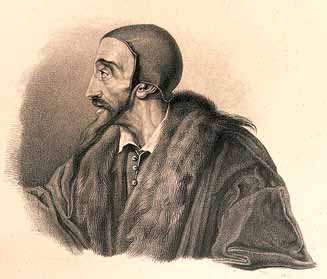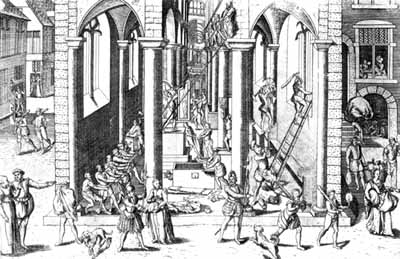 |
Faith under Attack
Vatican Paper Defends Calvinism
Lyle J. Arnold, Jr.
On Friday, July 3, 2009, the Vatican newspaper L'Osservatore Romano (OR) showered praise on John Calvin, the arch-enemy of Catholicism, who, according to the words of Pope Gregory XVI in his encyclical Inter praecipuas, "dared to oppose the changeless doctrine of the Faith with an almost incredible variety of errors ... [leaving] no means untried to deceive the faithful with perverse explanations of the Sacred Books." (1)
The TIA translation desk passed on to me the principal texts of that article in English, translated from the Italian issue of the OR. I am sharing these excerpts with my readers because I believe our media commented on only a very small part of them.
The article, “The reformer who disincarnated the Incarnation,” was written by Alain Besançon. He is a member of the French Academy of Social and Political Sciences, an author, journalist and professor. In the U.S. he taught at Columbia, Rochester, Princeton and other universities. Today, among many occupations, he is a French correspondent for the OR.
The reason for his article is explained in a secondary title: “500 years after his birth, Pleiade publishes the works of Calvin.” Pleiade, perhaps the most prestigious publisher in France, carefully selects the classics it prints. Besançon takes advantage of the launching of this book to make an apologia of the Protestant leader.
The main texts of his article in the original Italian edition of OR are translated below:
- I think of the many men who have caused a segment of mankind to move away from its habitual historic path, who had the strength to give it a new direction. I see none but two: Rousseau who transformed the 19th century and also the 20th, and even more, Calvin. Precisely because he was extraordinary, we still did not have a volume on Calvin in the most renowned collection of French classics. … Behold - Calvin finally is in the Pleiade.
- I want to refute some of the common prejudices [about him] … Even though he did not want the Mother of God to be the object of preaching, he honored her and firmly believed in her perpetual virginity. He kept two sacraments, Baptism and the Supper.
- Contrary to what is often said, he believed in the real presence, even though he did not admit the Catholic concept of Transubstantiation. He adhered to two principles of justification by faith - sola fidei, sola gratia - and the sovereignty of the Bible - sola scriptura.

The heretic John Calvin |
- He could not bear the ensemble of all that had been accumulated in the churches of his time - too many statues being venerated, doubtful relics that he viewed – with reason - as a fall into idolatry. While promoting a profound purification of the temples, mowing down the dense pasture of dogmatic traditions, expelling the broad mayhem of popular devotions, I believe he did not want to change the dogma of the Incarnation … He developed it in a more abstract way; he stressed it; he intellectualized it. He disincarnated the Incarnation. In his Institutes of the Christian Religion, he explains it in a geometric way.
- Doing so, he inserted himself into the great current calling for an individual relationship with God that appeared at the beginning of the 14th century and still today continues to affirm itself. He preached individualism, a personal relationship with God, society, the State and the law: Calvin was in tune with modernity before its time.
- He founded an ecclesiastical system both focused on civil society and, at the same time, independent. … The Calvinist organization is a genial creation. …
- Calvin fought on every front - against the papists above all, but also against the ‘nicodemists’ (those who were seeking a compromise with Rome) and the Baptists.
- It is well-known that he wanted to be buried in a simple, discrete place. Today we do not know the exact place of his grave (like Moses) in the Geneva cemetery.
These excerpts clearly show that Besançon made a full apologia of the Calvinist sect, trying to make Calvinism palatable to Catholics. The Vatican paper did not, therefore, just offer a few words of praise of Calvin - “he was extraordinary” - as our American media reported. The eulogy it made is much graver and goes much further. An entire Calvinist vision of world, church and society is presented as “genial” by Besançon and endorsed by the OR.
Biased interpretations, historic lies, dogmatic amputations, moral crimes, social and political misconceptions of State and Church are justified in the very organ of the Holy See, which supposedly should tell us the truth and confirm us in the Faith. What an extreme inversion of roles we are witnessing!
I stress that the OR’s blessings of Calvin are undisputable, excluding any possibility that the words are being taken out of context.
Dissecting Calvinism
Calvinism is a direct offshoot of the Zwinglian cult, not, as many people think, of the Lutheran. The Swiss reformer Ulrich Zwingli was to the left of Luther doctrinally, liturgically and aesthetically, stripping all the churches of art and music. He was slain in battle in 1531 as he led soldiers against the Catholic cantons.

Protestants destroying statues and ornaments of the churches,
a work quite similar to Paul VI's liturgical reform... |
Jean Cauvin (aka John Calvin) was a French lawyer in the early 16th century who apostatized from the Catholic Church. He worked tirelessly in Geneva to establish his Calvinist creed and founded a religious police State there, where he employed harsh penalties, espionage, and religious sanctions to enforce a drab and severe religious code. (2)
These are some main points of the Calvinist theology:
- The inadmissibility of grace;
- Absolute predestination decreed by God for some people independent of any merit or demerit. God, according to His choice, destines persons to hell or to paradise; hence the works of those predestined to beatitude, even if evil, are considered as good by God, while the works of the future damned are evil without qualification.
- The church dictates to the State.
- Calvinism goes so far as to implicate God with sin since if God damns a soul to hell, He must also force that soul to sin to deserve hell. (3)
Here then is the system of religious heresy that L'Osservatore Romano praised.
One could make a self-deceptive statement that Benedict XVI does not adhere to this tribute to heresy. But it is common knowledge that OR follows the orientation of the Secretary of State, Card. Tarcisio Bertone, who is the right hand of the Pope.
Besides, this is the same orientation Benedict XVI has always followed during his life: a very friendly approach toward Protestantism
1 Pope Gregory XVI, Inter praecipuas n, 4, May 8, 1844
2 William J. Whalen, Separated Brethren (Milwaukee: Bruce Pub., 1958), pp. 48-49.
3. Parente, Piolanti, Garofalo, Dictionary of Dogmatic Theology (Milwaukee: Bruce Pub., 1951), p. 37.

Posted on July 15, 2009

Related Articles of Interest
 Luther: No! Absolutely No! Luther: No! Absolutely No!
 St. Robert Bellarmine fights against Calvinism St. Robert Bellarmine fights against Calvinism
 Non possumus Non possumus
 Card. Willebrands: Luther is our common master Card. Willebrands: Luther is our common master
 Ratzinger gives Communion to Protestant Roger Schultz Ratzinger gives Communion to Protestant Roger Schultz
 Schutz converted. You are wrong. Read the response Schutz converted. You are wrong. Read the response
 Paul VI with Protestants he invited to help write the New Mass Paul VI with Protestants he invited to help write the New Mass
 John Paul II kisses the hand of Rowan Williams John Paul II kisses the hand of Rowan Williams
 Protestant Oscar Cullmann considered Ratzinger a radical Protestant Oscar Cullmann considered Ratzinger a radical
 Luther thought he was divine Luther thought he was divine
 Is the New Mass Protestant? Is the New Mass Protestant?
 The Lutheran and Calvinist mentalities The Lutheran and Calvinist mentalities

Related Works of Interest
|
|
Faith under Attack | Religious | Home | Books | CDs | Search | Contact Us | Donate

© 2002-
Tradition in Action, Inc. All Rights Reserved
|
 |
|